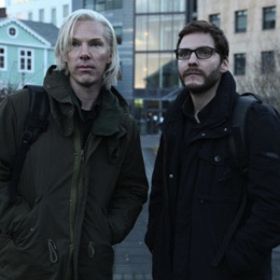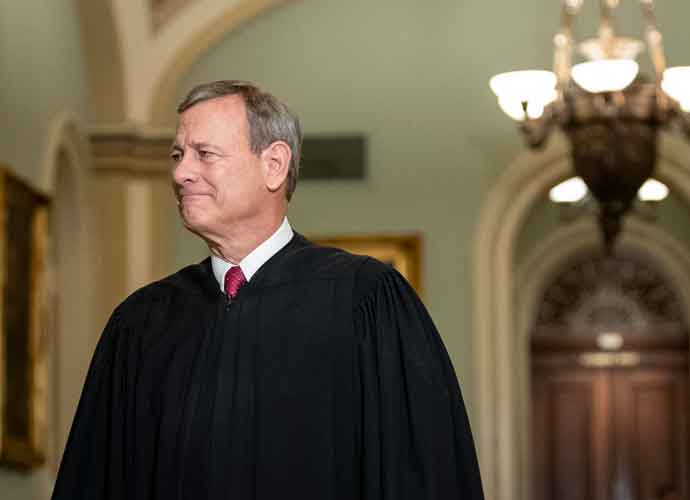'The Fifth Estate' And 'Mediastan' Review: Two Opposing WikiLeaks Films Give Insight Into Julian Assange

2/5
The Fifth Estate and Mediastan are two opposing films that, together, provide an unflattering portrait of WikiLeaks founder Julian Assange.
WikiLeaks founder Julian Assange has done nothing to conceal his loathing for The Fifth Estate, the movie released October 18th that is an adaptation of two books written about WikiLeaks, one of them written by Daniel Domscheit-Berg, an original partner in the whistle-blower organization (he and Assange have since parted ways).
Starring Benedict Cumberbatch as Assange and Daniel Bruhl as Domscheit-Berg, The Fifth Estate was an unquestionable flop at the box office, possibly because people like a story with some kind of ending, and as it is now, Assange’s story doesn’t have one. Lacking suspense and any insightful angle, The Fifth Estate flounders through its duration, wasting the considerable talent of all involved.
This is a movie that had tremendous potential to evolve into a more in-depth character study of Julian Assange, or evaluate the ethical impasse at which Assange and Domscheit-Berg arrived before their public and rather embarrassing rivalry. Instead, it is a shallow portrayal of a very complex and delicate subject, distracted by various side plots that take up too much time without making any real contribution to the greater arc of the movie. At the end of the film, Cumberbatch, in character echoes some of Assange’s statements condemning the film, namely that Dreamworks bought the rights to the two most inaccurate and skewed books about WikiLeaks and used them to make the movie. Given that Assange feels that the movie was inaccurate and then put out his own film, an appropriate approach would be to watch both and determine whether the truth is somewhere in between.
Mediastan is a documentary produced by Assange that catalogues the exploits of several activists traveling through central Asia. Under the guise of simply interviewing local newspaper editors about journalistic ethics, they put feelers out for papers that may be willing to publish the leaked diplomatic cables that went on to become the biggest confidentiality breach in history. Mediastan is not particularly ground breaking: media censorship is an old topic debated a hundred different ways. The regional choice is what’s crucial here: countries such as Turkmenistan, Tajikistan, Uzbekistan and Afghanistan have prominent news outlets with a variety of surprising influences- one of the editors-in-chief featured in the film is also a member of Parliament appointed by the head of state, and another newspaper accepts funds from the US State Department.
Most Western audiences (assumedly the majority of Mediastan’s viewers) are unfamiliar with the forces at work in the area and the film is an enlightening primer on a region that is changing, but continues to remain a mystery. There is a lot of tea drinking. There is also a lot of Johannes Wahlstrom, the primary activist featured in the film. I use the word “activist” and not “journalist” because even though he introduces himself as such, Wahlstrom has been largely discredited after accusations of falsifying quotes led to the retraction of a story he wrote for a Swedish magazine. Though I was not aware of this when watching Mediastan, in retrospect, choosing him as the primary person in the film is hilariously ironic. This is sort of the icing on the “Julian Assange sucks” cake: everyone knows he doesn’t care what anyone thinks of him, but choosing this caliber of person to head a documentary about journalistic ethics is ludicrous to the point where I suspect, as a viewer, I’m being trolled.
Where both films seem to agree, either intentionally or by accident, is in the assertion that Julian Assange is a bafflingly arrogant man with no regard, or possibly even understanding of, the way people communicate with each other. And he seems to use his personal policies in the way he manages and uses WikiLeaks. An embarrassingly awkward interview in Mediastan with the editor in chief of the Guardian (who is played by a considerably less timid Peter Capaldi in The Fifth Estate) shows the WikiLeaks activists tirelessly grilling him on the approach taken by the Guardian when publishing the cables. What he tries to explain is that the paper has to abide by British media law. The supercilious activists’ questions indicate that WikiLeaks did not expect one of the largest newspapers in the world to be fettered by trivial things like well-established legal precedents because, in their eyes, the information they had is more valuable than loyalty to the law. Mediastan takes the same attitude towards several of the editors and correspondents they speak to scattered throughout central Asia. Similarly, in The Fifth Estate, Assange is consistently aggravated by those who don’t agree with him, from newspaper editors to politicians down to his hacktivist colleagues. While The Fifth Estate’s Assange is a meticulous depiction of the man, Mediastan supports this particular aspect of The Fifth Estate clumsily and obviously unintentionally.
The movies also share a considerably more horrifying common ground: both seem quite cavalier about the sex crime accusations brought up against Julian Assange. In The Fifth Estate, it is literally a footnote at the end of the film, a brief screen of text before the credits start rolling. I thought maybe it would be best if they hadn’t mentioned the topic at all – that is, until I saw Mediastan, which had an infinitely worse moment. I’m still unsure if it was a tremendous editorial oversight or a deliberate attempt to test how high my blood temperature can go before I spontaneously combust: in an example of the frivolity of media bias, Mediastan briefly touches on the Occupy Wall Street movement. There is an audio clip of a news show interviewing a female New York Post reporter who spent a night in Zucotti Park, ground zero for the Occupy movement. She commented on her fear of being raped during the night she spent there. The clips playing in the background are of Occupiers playing guitar, hanging out, and having peaceful fun. This is jaw-dropping. In an attempt to totally discredit media coverage of Occupy Wall Street as alarmist and irrevocably biased against the movement, the most outrageous and exaggerated claim they could find is a reporter afraid of getting raped while spending a night there? Really? That’s the worst they could find? False. There was no shortage of misinformation and sensationalist claims against Occupy Wall Street during its brief tenure in New York. The stupidity and insensitivity required to pick out a particular clip of a reporter expressing, albeit somewhat nonchalantly, that she was afraid of getting assaulted as a primary example of sensationalist coverage is not really quantifiable – not so much based on the choice alone but also given Assange’s current circumstances: hiding out in the Ecuadorian embassy in London to avoid extradition to face sex crime charges. Again, I know Julian Assange has no regard for what others think of him, but, again, this feels like trolling.
It’s interesting how Mediastan and The Fifth Estate conflict and cooperate, both in message and execution. Armed with a large budget and a star-studded lineup, The Fifth Estate falls woefully short of the considerably smaller Mediastan in terms of engaging content, but when the two are combined, the consistencies between them are noticeable, damning and disconcerting. We’re still not sure how the WikiLeaks debacle is going to end, but hopefully by then it’ll be a story someone will be willing to navigate with some degree of passion and dedication, two areas The Fifth Estate lacks. After a flop like this, though, I don’t anticipate Daniel Bruhl and Benedict Cumberbatch signing on for the sequel.
Get Uinterview's FREE iPhone App For Daily News Updates here.
Get the FREE Uinterview iPad app here and watch our videos anywhere.
RELATED ARTICLES
Get the most-revealing celebrity conversations with the uInterview podcast!







Leave a comment